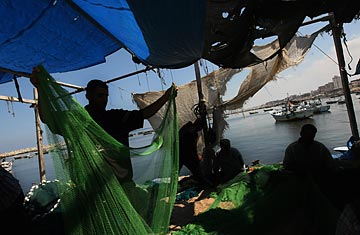
Palestinian fishermen prepare their nets at the port in Gaza City on September 1.
The Loggerhead sea turtle was still alive, but barely. As it lay on its back on the pavement, occasionally flapping its fins, the fisherman who had caught it when it got stuck in his net a few miles off the coast of the Gaza Strip said he would take it home and eat it. The fisherman, who gave his name only as "Abu Mohamed," admitted that his catch was illegal. Loggerheads are classified internationally as an endangered species. But these days, environmental protection is rarely enforced in Gaza's waters. That's because, according to fishermen and local maritime officials, life has gotten far too desperate to play by the rules.
The Gaza Strip has been under an Israeli blockade since 2007, when the Islamist group Hamas took control of the territory. The blockade has crippled Gaza's economy, leaving 85% of the population dependent on humanitarian aid to survive. At sea, fishermen are restricted to three nautical miles from the coast, creating a crowded, overfished shoreline. "The big fish can be found after six miles, but the fishermen cannot go that far, so they catch what's available," says Mohamed al-Hissi, who serves as a liaison for fishermen affairs at the General Syndicate of Marine Fishers in Gaza City.
Catches like endangered sea turtles are only one of the signs of a besieged industry. Al-Hissi says fishermen are also using nets with smaller holes that they smuggle in from Egypt. "This allows them to catch very small fish, and this is against regulations... This does not allow the fish to grow up. If this continues, it will destroy the environment." The Palestinian National Authority was once able to enforce these rules. But now, Al-Hissi says, "We can't control it because there are no alternatives."
Israel used to deem fishermen low security risks. Before Israel's "disengagement" in 2005, "during the curfews, the Israelis would call over loudspeakers to tell the fishermen that they were allowed to go to their boats to fish," says al-Hissi, who has worked with Gaza's fishermen for the past 13 years. "With a fisherman's license, you could move, even during the curfew." But he has watched with alarm as the strip's fishing radius has shrank with each political setback; the fishing industry and the coastal environment becoming collateral damage in a larger conflict that the fishermen say they have no direct role in.
Since last winter's Israeli offensive in Gaza, Operation Cast Lead, the fishermen say the daily hazards have only gotten worse. By day, the silhouettes of Israeli navy vessels are visible on the Mediterranean horizon. And by night, the thudding explosion of Israeli shells a few miles out to sea is audible even from the shore. "Every night there is shooting. They don't shoot directly at us. But when you get close to the three mile mark, they will fire into the water as a warning," says 23-year-old fisherman Ahmed Habil.
Human rights organizations say fishermen also face the possibility of arrest while at sea. Several fishermen who spoke to TIME, say their boats were confiscated from within the current three mile limit in recent months; members of their crew forced to swim to nearby Israeli navy vessels, and then taken to Israel for questioning. "The Israelis took my boat five months ago, when it was about three kilometers out to sea," says Subhi Abdallah, a 60-year-old fisherman whose son was arrested when the boat was taken. "They took my son to [the Israeli port city of] Ashdod for 24 hours and then released him . . . They said they would send the boat back. They still haven't." The Israeli Defense Forces say Gaza's coastal waters are used for "attempted infiltrations into Israeli territory" to launch terrorist attacks on Israeli civilians and strategic facilities, as well as to smuggle arms.
Health experts say the sea blockade may have dangerous implications for the Gazan diet. Several of Gaza's key sewage treatment and transport facilities were destroyed during last winter's war with Israel. Now, much of Gaza's sewage flows directly into the sea. "If the sewage is not treated, there will be a high level of metallic elements in the sea, including mercury," says Mohamed Elmi, the World Health Organization's Middle East regional adviser for food and chemicals. "[Mercury] affects your nervous system and your mental capability and capacity. It's a very poisonous metal. And if there is a high level of parasites in the fish then you also have the problem of parasitic diseases. We don't know what is in the sewage cocktail."
Despite the hazards of fishing and a questionable future for Gaza's fishing industry, al-Hissi says fishing is still on the rise. "There are no other opportunities because people can no longer work in Israel. We used to have 100 small boats in use for fishing. Now we have 400." The new fishermen are putting added strain on an ecosystem already in peril, with some resorting to unconventional methods, such as dynamite or poison to kill the fish. "This is even more dangerous than the sewage," says al-Hissi.
At the main dock in Gaza city, many of the fishermen call their predicament "an economic war." Abu Mohamed, pulled empty nets from his boat after a fruitless night of fishing. Just hours before, in the early morning, Abu Mohamed's boat had been shot at. "This is terrorism," he said. "Sometimes we feel like we are fighting to fish."
